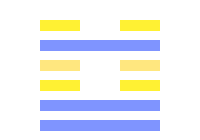Hexagramme 60 du Yi Jing - Trait 6
L'hexagramme : 60
Un hexagramme est une combinaison de six traits yin et yang.

60.6 (60 > 61) - THE KIEH HEXAGRAM.
The topmost line, divided, shows its subject enacting regulations severe and difficult. Even with firmness and correctness there will be evil. But though there will be cause for repentance, it will (by and by) disappear.
Bing DeepL Google Yandex60.6 (60 > 61) - Strong pressure
One is confronted to greater constraints than expected.
Bing DeepL Google Yandex60.6 (60 > 61) - Strong pressure
One is confronted to greater constraints than expected.
Bing DeepL Google Yandex60.6 (60 > 61) - Tsieh, la délimitation
Tsieh : règle, loi, mesure.
Les lois dures ont des conséquences très fâcheuses pour la prospérité. Le repentir (causé par leur violation) s’effacera. [Leur force et valeur s’épuiseront.] (Quand le peuple sent que les lois sont cruelles, il les viole sans scrupule ni repentir.)
Bing DeepL Google Yandex60.6 (60 > 61) - Forte pression
On subit des contraintes plus fortes que prévu.
Bing DeepL Google YandexLes trigrammes
Les trigrammes sont des combinaisons de trois traits yin et yang. Dans l'hexagramme, les trois traits du dessous constituent le trigramme inférieur et représentent la situation intérieure. Les trois lignes du haut constituent le trigramme supérieur et représentent la situation extérieure.
trigSup2


trigInf

L'hexagramme nucléaire : 27
L'hexagramme nucléaire est l'association des deux trigrammes intérieurs (traits 2,3,4 et 3,4,5). Il représente la racine, ou l'origine de la situation.

27 - THE Î HEXAGRAM.
Î indicates that with firm correctness there will be good fortune (in what is denoted by it). We must look at what we are seeking to nourish, and by the exercise of our thoughts seek for the proper aliment.
Bing DeepL Google Yandex27 - I, l’alimentation
Ī : 1. Entretenir, soutenir ; 2. Menton, côté de la bouche ; 3. Profond.
Texte
Entretenir : achève heureusement. (Il faut) examiner soigneusement comment on entretient. On doit chercher soi-même ce qui est bon pour sa bouche.
Symbolisme
Une montagne au-dessus du tonnerre (image de celui qui réprime ses désirs, restreint ses tendances). Le sage s’observe ainsi en ses paroles et modère l’usage des aliments.
Commentaire
Entretenir sa rectitude est cause de bonheur. On doit examiner ce que l’on entretient et ce qui doit nous entretenir. Le ciel et la terre entretiennent tout ; le saint entretient la sagesse pour atteindre par eux tous les peuples. Grande est l’opportunité de l’entretien.
Le dérivé (Fan Yao) : 61.6
Le même trait sur l'hexagramme après la mutation. Il représente ce qui peut être fait APRÈS pour corriger la situation décrite par ce trait, un peu comme un remède ou une solution.

61.6 (61 > 60) - THE KUNG FÛ HEXAGRAM.
The topmost line, undivided, shows its subject in chanticleer (trying to) mount to heaven. Even with firm correctness there will be evil.
Bing DeepL Google Yandex61.6 (61 > 60) - Raising doubts about one's good faith
The others have no confidence because one has answered too quickly.
Bing DeepL Google Yandex61.6 (61 > 60) - Raising doubts about one's good faith
The others have no confidence because one has answered too quickly.
Bing DeepL Google Yandex61.6 (61 > 60) - Tchong, la vérité intérieure
Tchōng : juste milieu, vertu, droiture, sincérité, absence d’égoïsme, fidélité digne de confiance (fou).
Si le faisan rouge voulait s’élever dans le ciel, l’issue de cette tentative serait funeste.
Comment pourrait-il réussir ? (Image de l’ambition excessive qui ne peut qu’échouer.)
61.6 (61 > 60) - Faire douter de sa bonne foi
Les autres n'ont pas confiance car on a répondu trop vite.
Bing DeepL Google Yandex61.6 (61 > 60) - Mozdulatlanság
Nem bíznak benne mert túl gyorsan válaszolt.
Bing DeepL Google YandexLa jointure: 61.1
Le dérivé du réciproque. Il représente ce qui aurait pu être fait AVANT pour prévenir la situation décrite par ce trait, un peu comme un remède ou une solution.

61.1 (61 > 59) - THE KUNG FÛ HEXAGRAM.
The first line, undivided, shows its subject resting (in himself). There will be good fortune. If he sought to any other, he would not find rest.
Bing DeepL Google Yandex61.1 (61 > 59) - Anticipating a shortage
One prepares what is necessary while waiting for the demand.
Bing DeepL Google Yandex61.1 (61 > 59) - Anticipating a shortage
One prepares what is necessary while waiting for the demand.
Bing DeepL Google Yandex61.1 (61 > 59) - Tchong, la vérité intérieure
Tchōng : juste milieu, vertu, droiture, sincérité, absence d’égoïsme, fidélité digne de confiance (fou).
Une circonspection ferme est heureuse ; une conduite différente n’amènera pas de sujet de joie. [Si ces dispositions changent.] Il faut une paix intérieure vigilante, autrement pas de joie.
Bing DeepL Google Yandex61.1 (61 > 59) - Anticiper un manque
On prépare le nécessaire en attendant la demande.
Bing DeepL Google Yandex61.1 (61 > 59) - Mozdulatlanság
Felkészülni a szükségesre de várni hogy kérjenek rá.
Bing DeepL Google YandexLe réciproque : 59.1
L'hexagramme renversé. Il représente la situation opposée, et en tant que tel est essentiel pour la validation des commentaires.

59.1 (59 > 61) - THE HWÂN HEXAGRAM.
The first line, divided, shows its subject engaged in rescuing (from the impending evil) and having (the assistance of) a strong horse. There will be good fortune.
Bing DeepL Google Yandex59.1 (59 > 61) - Providing for surpluses
One examines the reserves to see if they are in order.
Bing DeepL Google Yandex59.1 (59 > 61) - Providing for surpluses
One examines the reserves to see if they are in order.
Bing DeepL Google Yandex59.1 (59 > 61) - Hwán, la dissolution
Hwán : extension, exposition, développement, abondance débordante ; dispersion, dissipation.
On doit remédier à cette dispersion, en délivrer un État. Si l’on use de toute force (litt. : d’une force de cheval) pour cela, on réussira [à rétablir l’ordre et l’obéissance.]. — Explication du second sens. — On doit surtout user de sages enseignements et exhortations.
Bing DeepL Google Yandex59.1 (59 > 61) - Prévoir des surplus
On examine les réserves pour voir si elles sont en ordre.
Bing DeepL Google YandexMutations

60.6 (60 > 61) - THE KIEH HEXAGRAM.
The topmost line, divided, shows its subject enacting regulations severe and difficult. Even with firmness and correctness there will be evil. But though there will be cause for repentance, it will (by and by) disappear.
Bing DeepL Google Yandex60.6 (60 > 61) - Strong pressure
One is confronted to greater constraints than expected.
Bing DeepL Google Yandex60.6 (60 > 61) - Strong pressure
One is confronted to greater constraints than expected.
Bing DeepL Google Yandex60.6 (60 > 61) - Tsieh, la délimitation
Tsieh : règle, loi, mesure.
Les lois dures ont des conséquences très fâcheuses pour la prospérité. Le repentir (causé par leur violation) s’effacera. [Leur force et valeur s’épuiseront.] (Quand le peuple sent que les lois sont cruelles, il les viole sans scrupule ni repentir.)
Bing DeepL Google Yandex60.6 (60 > 61) - Forte pression
On subit des contraintes plus fortes que prévu.
Bing DeepL Google Yandex
60.1.6 (60 > 59) - THE KIEH HEXAGRAM.
- 1. The first line, undivided, shows its subject not quitting the courtyard outside his door. There will be no error.
- 6. The topmost line, divided, shows its subject enacting regulations severe and difficult. Even with firmness and correctness there will be evil. But though there will be cause for repentance, it will (by and by) disappear.
60.1.6 (60 > 59) - Losing allies for futile reasons
One is ridiculed by those who could have defended what one had imagined.
Bing DeepL Google Yandex60.1.6 (60 > 59) - Losing allies for futile reasons
One is ridiculed by those who could have defended what one had imagined.
Bing DeepL Google Yandex60.1.6 (60 > 59) - Tsieh, la délimitation
Tsieh : règle, loi, mesure.
-
1. Tel ne sort pas de la porte extérieure de son habitation et n’en a point de regret.
(Dès qu’il voit tout ce qui se passe chez lui, il peut tout y bien gouverner.) Quand on sait qu’il y a lieu de ne pas sortir ou bien empêchement. - 6. Les lois dures ont des conséquences très fâcheuses pour la prospérité. Le repentir (causé par leur violation) s’effacera. [Leur force et valeur s’épuiseront.] (Quand le peuple sent que les lois sont cruelles, il les viole sans scrupule ni repentir.)
60.1.6 (60 > 59) - Perdre ses alliés pour des motifs futiles
On est ridiculisé par ceux qui auraient pu défendre ce qu'on avait imaginé.
Bing DeepL Google Yandex60.1.6 (60 > 59) - Korlátozás
- 1. Nem gyötri saját magát tovább miközben várja hogy visszatérjenek a barátai.
- 6. Nagy nyomás alatt.

60.2.6 (60 > 42) - THE KIEH HEXAGRAM.
- 2. The second line, undivided, shows its subject not quitting the courtyard inside his gate. There will be evil.
- 6. The topmost line, divided, shows its subject enacting regulations severe and difficult. Even with firmness and correctness there will be evil. But though there will be cause for repentance, it will (by and by) disappear.
60.2.6 (60 > 42) - Revealing one's qualities
One is considered to have received enough incentives.
Bing DeepL Google Yandex60.2.6 (60 > 42) - Revealing one's qualities
One is considered to have received enough incentives.
Bing DeepL Google Yandex60.2.6 (60 > 42) - Tsieh, la délimitation
Tsieh : règle, loi, mesure.
-
2. Mais s’il ne passe pas la porte intérieure de la maison (celle du quartier intérieur, du quartier des femmes), il éprouvera les mauvais effets de cette conduite. (Ne voyant que partiellement ce qui se passe chez lui, il pourra lui arriver des désagréments.)
Il manquera le point de temps extrême pour faire le nécessaire selon les circonstances. - 6. Les lois dures ont des conséquences très fâcheuses pour la prospérité. Le repentir (causé par leur violation) s’effacera. [Leur force et valeur s’épuiseront.] (Quand le peuple sent que les lois sont cruelles, il les viole sans scrupule ni repentir.)
60.2.6 (60 > 42) - Révéler ses qualités
On passe pour avoir reçu des encouragements suffisants.
Bing DeepL Google Yandex60.2.6 (60 > 42) - Korlátozás
- 2. Elrejti a bizonytalanságokat hogy uralja a helyzetet.
- 6. Nagy nyomás alatt.

60.1.2.6 (60 > 20) - THE KIEH HEXAGRAM.
- 1. The first line, undivided, shows its subject not quitting the courtyard outside his door. There will be no error.
- 2. The second line, undivided, shows its subject not quitting the courtyard inside his gate. There will be evil.
- 6. The topmost line, divided, shows its subject enacting regulations severe and difficult. Even with firmness and correctness there will be evil. But though there will be cause for repentance, it will (by and by) disappear.
60.1.2.6 (60 > 20) - The limit
One starts again from scratch to rediscover the taste of the first emotions.
Bing DeepL Google Yandex60.1.2.6 (60 > 20) - The limit
One starts again from scratch to rediscover the taste of the first emotions.
Bing DeepL Google Yandex60.1.2.6 (60 > 20) - Tsieh, la délimitation
Tsieh : règle, loi, mesure.
-
1. Tel ne sort pas de la porte extérieure de son habitation et n’en a point de regret.
(Dès qu’il voit tout ce qui se passe chez lui, il peut tout y bien gouverner.) Quand on sait qu’il y a lieu de ne pas sortir ou bien empêchement. -
2. Mais s’il ne passe pas la porte intérieure de la maison (celle du quartier intérieur, du quartier des femmes), il éprouvera les mauvais effets de cette conduite. (Ne voyant que partiellement ce qui se passe chez lui, il pourra lui arriver des désagréments.)
Il manquera le point de temps extrême pour faire le nécessaire selon les circonstances. - 6. Les lois dures ont des conséquences très fâcheuses pour la prospérité. Le repentir (causé par leur violation) s’effacera. [Leur force et valeur s’épuiseront.] (Quand le peuple sent que les lois sont cruelles, il les viole sans scrupule ni repentir.)
60.1.2.6 (60 > 20) - La limite
On repart à zéro pour retrouver le goût des premiers émois.
Bing DeepL Google Yandex60.1.2.6 (60 > 20) - Korlátozás
- 1. Nem gyötri saját magát tovább miközben várja hogy visszatérjenek a barátai.
- 2. Elrejti a bizonytalanságokat hogy uralja a helyzetet.
- 6. Nagy nyomás alatt.

60.3.6 (60 > 9) - THE KIEH HEXAGRAM.
- 3. The third line, divided, shows its subject with no appearance of observing the (proper) regulations, in which case we shall see him lamenting. But there will be no one to blame (but himself).
- 6. The topmost line, divided, shows its subject enacting regulations severe and difficult. Even with firmness and correctness there will be evil. But though there will be cause for repentance, it will (by and by) disappear.
60.3.6 (60 > 9) - Tsieh, la délimitation
Tsieh : règle, loi, mesure.
- 3. Qui n’observe pas les lois s’en repentira suffisamment par la suite et se lamentera sans que personne ait besoin de le blâmer. (Ou bien : s’en repentira si amèrement que personne n’aura le courage de le blâmer.)
- 6. Les lois dures ont des conséquences très fâcheuses pour la prospérité. Le repentir (causé par leur violation) s’effacera. [Leur force et valeur s’épuiseront.] (Quand le peuple sent que les lois sont cruelles, il les viole sans scrupule ni repentir.)
60.3.6 (60 > 9) - Korlátozás
- 3. Túl gyenge hogy táplálja a csoportját így felkészül hogy felszámolja a függőségüket.
- 6. Nagy nyomás alatt.

60.1.3.6 (60 > 57) - THE KIEH HEXAGRAM.
- 1. The first line, undivided, shows its subject not quitting the courtyard outside his door. There will be no error.
- 3. The third line, divided, shows its subject with no appearance of observing the (proper) regulations, in which case we shall see him lamenting. But there will be no one to blame (but himself).
- 6. The topmost line, divided, shows its subject enacting regulations severe and difficult. Even with firmness and correctness there will be evil. But though there will be cause for repentance, it will (by and by) disappear.
60.1.3.6 (60 > 57) - The limit
One contacts a relative to request that they provide assistance.
Bing DeepL Google Yandex60.1.3.6 (60 > 57) - The limit
One contacts a relative to request that they provide assistance.
Bing DeepL Google Yandex60.1.3.6 (60 > 57) - Tsieh, la délimitation
Tsieh : règle, loi, mesure.
-
1. Tel ne sort pas de la porte extérieure de son habitation et n’en a point de regret.
(Dès qu’il voit tout ce qui se passe chez lui, il peut tout y bien gouverner.) Quand on sait qu’il y a lieu de ne pas sortir ou bien empêchement. - 3. Qui n’observe pas les lois s’en repentira suffisamment par la suite et se lamentera sans que personne ait besoin de le blâmer. (Ou bien : s’en repentira si amèrement que personne n’aura le courage de le blâmer.)
- 6. Les lois dures ont des conséquences très fâcheuses pour la prospérité. Le repentir (causé par leur violation) s’effacera. [Leur force et valeur s’épuiseront.] (Quand le peuple sent que les lois sont cruelles, il les viole sans scrupule ni repentir.)
60.1.3.6 (60 > 57) - La limite
On contacte un proche pour lui demander d'envoyer des secours.
Bing DeepL Google Yandex60.1.3.6 (60 > 57) - Korlátozás
- 1. Nem gyötri saját magát tovább miközben várja hogy visszatérjenek a barátai.
- 3. Túl gyenge hogy táplálja a csoportját így felkészül hogy felszámolja a függőségüket.
- 6. Nagy nyomás alatt.

60.2.3.6 (60 > 37) - THE KIEH HEXAGRAM.
- 2. The second line, undivided, shows its subject not quitting the courtyard inside his gate. There will be evil.
- 3. The third line, divided, shows its subject with no appearance of observing the (proper) regulations, in which case we shall see him lamenting. But there will be no one to blame (but himself).
- 6. The topmost line, divided, shows its subject enacting regulations severe and difficult. Even with firmness and correctness there will be evil. But though there will be cause for repentance, it will (by and by) disappear.
60.2.3.6 (60 > 37) - The limit
One erases one's codes to prevent others from finding.
Bing DeepL Google Yandex60.2.3.6 (60 > 37) - The limit
One erases one's codes to prevent others from finding.
Bing DeepL Google Yandex60.2.3.6 (60 > 37) - Tsieh, la délimitation
Tsieh : règle, loi, mesure.
-
2. Mais s’il ne passe pas la porte intérieure de la maison (celle du quartier intérieur, du quartier des femmes), il éprouvera les mauvais effets de cette conduite. (Ne voyant que partiellement ce qui se passe chez lui, il pourra lui arriver des désagréments.)
Il manquera le point de temps extrême pour faire le nécessaire selon les circonstances. - 3. Qui n’observe pas les lois s’en repentira suffisamment par la suite et se lamentera sans que personne ait besoin de le blâmer. (Ou bien : s’en repentira si amèrement que personne n’aura le courage de le blâmer.)
- 6. Les lois dures ont des conséquences très fâcheuses pour la prospérité. Le repentir (causé par leur violation) s’effacera. [Leur force et valeur s’épuiseront.] (Quand le peuple sent que les lois sont cruelles, il les viole sans scrupule ni repentir.)
60.2.3.6 (60 > 37) - La limite
On efface ses codes pour.empêcher les autres de trouver.
Bing DeepL Google Yandex60.2.3.6 (60 > 37) - Korlátozás
- 2. Elrejti a bizonytalanságokat hogy uralja a helyzetet.
- 3. Túl gyenge hogy táplálja a csoportját így felkészül hogy felszámolja a függőségüket.
- 6. Nagy nyomás alatt.

60.1.2.3.6 (60 > 53) - THE KIEH HEXAGRAM.
- 1. The first line, undivided, shows its subject not quitting the courtyard outside his door. There will be no error.
- 2. The second line, undivided, shows its subject not quitting the courtyard inside his gate. There will be evil.
- 3. The third line, divided, shows its subject with no appearance of observing the (proper) regulations, in which case we shall see him lamenting. But there will be no one to blame (but himself).
- 6. The topmost line, divided, shows its subject enacting regulations severe and difficult. Even with firmness and correctness there will be evil. But though there will be cause for repentance, it will (by and by) disappear.
60.1.2.3.6 (60 > 53) - The limit
One takes the place of one's protector but one is ready to give it back when asked for it.
Bing DeepL Google Yandex60.1.2.3.6 (60 > 53) - The limit
One takes the place of one's protector but one is ready to give it back when asked for it.
Bing DeepL Google Yandex60.1.2.3.6 (60 > 53) - Tsieh, la délimitation
Tsieh : règle, loi, mesure.
-
1. Tel ne sort pas de la porte extérieure de son habitation et n’en a point de regret.
(Dès qu’il voit tout ce qui se passe chez lui, il peut tout y bien gouverner.) Quand on sait qu’il y a lieu de ne pas sortir ou bien empêchement. -
2. Mais s’il ne passe pas la porte intérieure de la maison (celle du quartier intérieur, du quartier des femmes), il éprouvera les mauvais effets de cette conduite. (Ne voyant que partiellement ce qui se passe chez lui, il pourra lui arriver des désagréments.)
Il manquera le point de temps extrême pour faire le nécessaire selon les circonstances. - 3. Qui n’observe pas les lois s’en repentira suffisamment par la suite et se lamentera sans que personne ait besoin de le blâmer. (Ou bien : s’en repentira si amèrement que personne n’aura le courage de le blâmer.)
- 6. Les lois dures ont des conséquences très fâcheuses pour la prospérité. Le repentir (causé par leur violation) s’effacera. [Leur force et valeur s’épuiseront.] (Quand le peuple sent que les lois sont cruelles, il les viole sans scrupule ni repentir.)
60.1.2.3.6 (60 > 53) - La limite
On prend la place de son protecteur mais on est prêt à lui rendre quand il la demandera.
Bing DeepL Google Yandex60.1.2.3.6 (60 > 53) - Korlátozás
- 1. Nem gyötri saját magát tovább miközben várja hogy visszatérjenek a barátai.
- 2. Elrejti a bizonytalanságokat hogy uralja a helyzetet.
- 3. Túl gyenge hogy táplálja a csoportját így felkészül hogy felszámolja a függőségüket.
- 6. Nagy nyomás alatt.

60.4.6 (60 > 10) - THE KIEH HEXAGRAM.
- 4. The fourth line, divided, shows its subject quietly and naturally (attentive to all) regulations. There will be progress and success.
- 6. The topmost line, divided, shows its subject enacting regulations severe and difficult. Even with firmness and correctness there will be evil. But though there will be cause for repentance, it will (by and by) disappear.
60.4.6 (60 > 10) - The limit
One knows the reasons why it is difficult to retain one's close relations.
Bing DeepL Google Yandex60.4.6 (60 > 10) - The limit
One knows the reasons why it is difficult to retain one's close relations.
Bing DeepL Google Yandex60.4.6 (60 > 10) - Tsieh, la délimitation
Tsieh : règle, loi, mesure.
- 4. Les lois observées pacifiquement donnent la prospérité [et perpétuent le règne de la justice.]
- 6. Les lois dures ont des conséquences très fâcheuses pour la prospérité. Le repentir (causé par leur violation) s’effacera. [Leur force et valeur s’épuiseront.] (Quand le peuple sent que les lois sont cruelles, il les viole sans scrupule ni repentir.)
60.4.6 (60 > 10) - La limite
On connaît les raisons pour lesquelles on a des difficultés à retenir ses proches.
Bing DeepL Google Yandex60.4.6 (60 > 10) - Korlátozás
- 4. Vonakodik hogy kérje másoktól hogy elfogadják a fáradtságot, így befejezi az előkészítést a legalkalmasabbal.
- 6. Nagy nyomás alatt.

60.1.4.6 (60 > 6) - THE KIEH HEXAGRAM.
- 1. The first line, undivided, shows its subject not quitting the courtyard outside his door. There will be no error.
- 4. The fourth line, divided, shows its subject quietly and naturally (attentive to all) regulations. There will be progress and success.
- 6. The topmost line, divided, shows its subject enacting regulations severe and difficult. Even with firmness and correctness there will be evil. But though there will be cause for repentance, it will (by and by) disappear.
60.1.4.6 (60 > 6) - Tsieh, la délimitation
Tsieh : règle, loi, mesure.
-
1. Tel ne sort pas de la porte extérieure de son habitation et n’en a point de regret.
(Dès qu’il voit tout ce qui se passe chez lui, il peut tout y bien gouverner.) Quand on sait qu’il y a lieu de ne pas sortir ou bien empêchement. - 4. Les lois observées pacifiquement donnent la prospérité [et perpétuent le règne de la justice.]
- 6. Les lois dures ont des conséquences très fâcheuses pour la prospérité. Le repentir (causé par leur violation) s’effacera. [Leur force et valeur s’épuiseront.] (Quand le peuple sent que les lois sont cruelles, il les viole sans scrupule ni repentir.)
60.1.4.6 (60 > 6) - Korlátozás
- 1. Nem gyötri saját magát tovább miközben várja hogy visszatérjenek a barátai.
- 4. Vonakodik hogy kérje másoktól hogy elfogadják a fáradtságot, így befejezi az előkészítést a legalkalmasabbal.
- 6. Nagy nyomás alatt.

60.2.4.6 (60 > 25) - THE KIEH HEXAGRAM.
- 2. The second line, undivided, shows its subject not quitting the courtyard inside his gate. There will be evil.
- 4. The fourth line, divided, shows its subject quietly and naturally (attentive to all) regulations. There will be progress and success.
- 6. The topmost line, divided, shows its subject enacting regulations severe and difficult. Even with firmness and correctness there will be evil. But though there will be cause for repentance, it will (by and by) disappear.
60.2.4.6 (60 > 25) - The limit
One considers that one has given others a chance to make amends.
Bing DeepL Google Yandex60.2.4.6 (60 > 25) - The limit
One considers that one has given others a chance to make amends.
Bing DeepL Google Yandex60.2.4.6 (60 > 25) - Tsieh, la délimitation
Tsieh : règle, loi, mesure.
-
2. Mais s’il ne passe pas la porte intérieure de la maison (celle du quartier intérieur, du quartier des femmes), il éprouvera les mauvais effets de cette conduite. (Ne voyant que partiellement ce qui se passe chez lui, il pourra lui arriver des désagréments.)
Il manquera le point de temps extrême pour faire le nécessaire selon les circonstances. - 4. Les lois observées pacifiquement donnent la prospérité [et perpétuent le règne de la justice.]
- 6. Les lois dures ont des conséquences très fâcheuses pour la prospérité. Le repentir (causé par leur violation) s’effacera. [Leur force et valeur s’épuiseront.] (Quand le peuple sent que les lois sont cruelles, il les viole sans scrupule ni repentir.)
60.2.4.6 (60 > 25) - La limite
On estime avoir donné aux autres une chance de faire amende honorable.
Bing DeepL Google Yandex60.2.4.6 (60 > 25) - Korlátozás
- 2. Elrejti a bizonytalanságokat hogy uralja a helyzetet.
- 4. Vonakodik hogy kérje másoktól hogy elfogadják a fáradtságot, így befejezi az előkészítést a legalkalmasabbal.
- 6. Nagy nyomás alatt.

60.1.2.4.6 (60 > 12) - THE KIEH HEXAGRAM.
- 1. The first line, undivided, shows its subject not quitting the courtyard outside his door. There will be no error.
- 2. The second line, undivided, shows its subject not quitting the courtyard inside his gate. There will be evil.
- 4. The fourth line, divided, shows its subject quietly and naturally (attentive to all) regulations. There will be progress and success.
- 6. The topmost line, divided, shows its subject enacting regulations severe and difficult. Even with firmness and correctness there will be evil. But though there will be cause for repentance, it will (by and by) disappear.
60.1.2.4.6 (60 > 12) - The limit
One refuses to believe a word of what others say.
Bing DeepL Google Yandex60.1.2.4.6 (60 > 12) - The limit
One refuses to believe a word of what others say.
Bing DeepL Google Yandex60.1.2.4.6 (60 > 12) - Tsieh, la délimitation
Tsieh : règle, loi, mesure.
-
1. Tel ne sort pas de la porte extérieure de son habitation et n’en a point de regret.
(Dès qu’il voit tout ce qui se passe chez lui, il peut tout y bien gouverner.) Quand on sait qu’il y a lieu de ne pas sortir ou bien empêchement. -
2. Mais s’il ne passe pas la porte intérieure de la maison (celle du quartier intérieur, du quartier des femmes), il éprouvera les mauvais effets de cette conduite. (Ne voyant que partiellement ce qui se passe chez lui, il pourra lui arriver des désagréments.)
Il manquera le point de temps extrême pour faire le nécessaire selon les circonstances. - 4. Les lois observées pacifiquement donnent la prospérité [et perpétuent le règne de la justice.]
- 6. Les lois dures ont des conséquences très fâcheuses pour la prospérité. Le repentir (causé par leur violation) s’effacera. [Leur force et valeur s’épuiseront.] (Quand le peuple sent que les lois sont cruelles, il les viole sans scrupule ni repentir.)
60.1.2.4.6 (60 > 12) - La limite
On refuse de croire un mot de ce que les autres disent.
Bing DeepL Google Yandex60.1.2.4.6 (60 > 12) - Korlátozás
- 1. Nem gyötri saját magát tovább miközben várja hogy visszatérjenek a barátai.
- 2. Elrejti a bizonytalanságokat hogy uralja a helyzetet.
- 4. Vonakodik hogy kérje másoktól hogy elfogadják a fáradtságot, így befejezi az előkészítést a legalkalmasabbal.
- 6. Nagy nyomás alatt.

60.3.4.6 (60 > 1) - THE KIEH HEXAGRAM.
- 3. The third line, divided, shows its subject with no appearance of observing the (proper) regulations, in which case we shall see him lamenting. But there will be no one to blame (but himself).
- 4. The fourth line, divided, shows its subject quietly and naturally (attentive to all) regulations. There will be progress and success.
- 6. The topmost line, divided, shows its subject enacting regulations severe and difficult. Even with firmness and correctness there will be evil. But though there will be cause for repentance, it will (by and by) disappear.
60.3.4.6 (60 > 1) - Getting stuck
One spends most of one's time preventing others from moving forward.
Bing DeepL Google Yandex60.3.4.6 (60 > 1) - Getting stuck
One spends most of one's time preventing others from moving forward.
Bing DeepL Google Yandex60.3.4.6 (60 > 1) - Tsieh, la délimitation
Tsieh : règle, loi, mesure.
- 3. Qui n’observe pas les lois s’en repentira suffisamment par la suite et se lamentera sans que personne ait besoin de le blâmer. (Ou bien : s’en repentira si amèrement que personne n’aura le courage de le blâmer.)
- 4. Les lois observées pacifiquement donnent la prospérité [et perpétuent le règne de la justice.]
- 6. Les lois dures ont des conséquences très fâcheuses pour la prospérité. Le repentir (causé par leur violation) s’effacera. [Leur force et valeur s’épuiseront.] (Quand le peuple sent que les lois sont cruelles, il les viole sans scrupule ni repentir.)
60.3.4.6 (60 > 1) - Se faire coincer
On passe le plus clair de son temps à empêcher les autres d'avancer.
Bing DeepL Google Yandex60.3.4.6 (60 > 1) - Korlátozás
- 3. Túl gyenge hogy táplálja a csoportját így felkészül hogy felszámolja a függőségüket.
- 4. Vonakodik hogy kérje másoktól hogy elfogadják a fáradtságot, így befejezi az előkészítést a legalkalmasabbal.
- 6. Nagy nyomás alatt.

60.1.3.4.6 (60 > 44) - THE KIEH HEXAGRAM.
- 1. The first line, undivided, shows its subject not quitting the courtyard outside his door. There will be no error.
- 3. The third line, divided, shows its subject with no appearance of observing the (proper) regulations, in which case we shall see him lamenting. But there will be no one to blame (but himself).
- 4. The fourth line, divided, shows its subject quietly and naturally (attentive to all) regulations. There will be progress and success.
- 6. The topmost line, divided, shows its subject enacting regulations severe and difficult. Even with firmness and correctness there will be evil. But though there will be cause for repentance, it will (by and by) disappear.
60.1.3.4.6 (60 > 44) - The limit
One hugs one's companions before leaving for work.
Bing DeepL Google Yandex60.1.3.4.6 (60 > 44) - The limit
One hugs one's companions before leaving for work.
Bing DeepL Google Yandex60.1.3.4.6 (60 > 44) - Tsieh, la délimitation
Tsieh : règle, loi, mesure.
-
1. Tel ne sort pas de la porte extérieure de son habitation et n’en a point de regret.
(Dès qu’il voit tout ce qui se passe chez lui, il peut tout y bien gouverner.) Quand on sait qu’il y a lieu de ne pas sortir ou bien empêchement. - 3. Qui n’observe pas les lois s’en repentira suffisamment par la suite et se lamentera sans que personne ait besoin de le blâmer. (Ou bien : s’en repentira si amèrement que personne n’aura le courage de le blâmer.)
- 4. Les lois observées pacifiquement donnent la prospérité [et perpétuent le règne de la justice.]
- 6. Les lois dures ont des conséquences très fâcheuses pour la prospérité. Le repentir (causé par leur violation) s’effacera. [Leur force et valeur s’épuiseront.] (Quand le peuple sent que les lois sont cruelles, il les viole sans scrupule ni repentir.)
60.1.3.4.6 (60 > 44) - La limite
On étreint ses compagnons avant de partir pour faire son travail.
Bing DeepL Google Yandex60.1.3.4.6 (60 > 44) - Korlátozás
- 1. Nem gyötri saját magát tovább miközben várja hogy visszatérjenek a barátai.
- 3. Túl gyenge hogy táplálja a csoportját így felkészül hogy felszámolja a függőségüket.
- 4. Vonakodik hogy kérje másoktól hogy elfogadják a fáradtságot, így befejezi az előkészítést a legalkalmasabbal.
- 6. Nagy nyomás alatt.

60.2.3.4.6 (60 > 13) - THE KIEH HEXAGRAM.
- 2. The second line, undivided, shows its subject not quitting the courtyard inside his gate. There will be evil.
- 3. The third line, divided, shows its subject with no appearance of observing the (proper) regulations, in which case we shall see him lamenting. But there will be no one to blame (but himself).
- 4. The fourth line, divided, shows its subject quietly and naturally (attentive to all) regulations. There will be progress and success.
- 6. The topmost line, divided, shows its subject enacting regulations severe and difficult. Even with firmness and correctness there will be evil. But though there will be cause for repentance, it will (by and by) disappear.
60.2.3.4.6 (60 > 13) - The limit
When one has made mistakes, one refrains from commenting on those of others.
Bing DeepL Google Yandex60.2.3.4.6 (60 > 13) - The limit
When one has made mistakes, one refrains from commenting on those of others.
Bing DeepL Google Yandex60.2.3.4.6 (60 > 13) - Tsieh, la délimitation
Tsieh : règle, loi, mesure.
-
2. Mais s’il ne passe pas la porte intérieure de la maison (celle du quartier intérieur, du quartier des femmes), il éprouvera les mauvais effets de cette conduite. (Ne voyant que partiellement ce qui se passe chez lui, il pourra lui arriver des désagréments.)
Il manquera le point de temps extrême pour faire le nécessaire selon les circonstances. - 3. Qui n’observe pas les lois s’en repentira suffisamment par la suite et se lamentera sans que personne ait besoin de le blâmer. (Ou bien : s’en repentira si amèrement que personne n’aura le courage de le blâmer.)
- 4. Les lois observées pacifiquement donnent la prospérité [et perpétuent le règne de la justice.]
- 6. Les lois dures ont des conséquences très fâcheuses pour la prospérité. Le repentir (causé par leur violation) s’effacera. [Leur force et valeur s’épuiseront.] (Quand le peuple sent que les lois sont cruelles, il les viole sans scrupule ni repentir.)
60.2.3.4.6 (60 > 13) - La limite
Quand on a fait des erreurs on s'abstient de commenter celles des autres.
Bing DeepL Google Yandex60.2.3.4.6 (60 > 13) - Korlátozás
- 2. Elrejti a bizonytalanságokat hogy uralja a helyzetet.
- 3. Túl gyenge hogy táplálja a csoportját így felkészül hogy felszámolja a függőségüket.
- 4. Vonakodik hogy kérje másoktól hogy elfogadják a fáradtságot, így befejezi az előkészítést a legalkalmasabbal.
- 6. Nagy nyomás alatt.

60.1.2.3.4.6 (60 > 33) - THE KIEH HEXAGRAM.
- 1. The first line, undivided, shows its subject not quitting the courtyard outside his door. There will be no error.
- 2. The second line, undivided, shows its subject not quitting the courtyard inside his gate. There will be evil.
- 3. The third line, divided, shows its subject with no appearance of observing the (proper) regulations, in which case we shall see him lamenting. But there will be no one to blame (but himself).
- 4. The fourth line, divided, shows its subject quietly and naturally (attentive to all) regulations. There will be progress and success.
- 6. The topmost line, divided, shows its subject enacting regulations severe and difficult. Even with firmness and correctness there will be evil. But though there will be cause for repentance, it will (by and by) disappear.
60.1.2.3.4.6 (60 > 33) - The limit
One frolics when one knows the other is not there.
Bing DeepL Google Yandex60.1.2.3.4.6 (60 > 33) - The limit
One frolics when one knows the other is not there.
Bing DeepL Google Yandex60.1.2.3.4.6 (60 > 33) - Tsieh, la délimitation
Tsieh : règle, loi, mesure.
-
1. Tel ne sort pas de la porte extérieure de son habitation et n’en a point de regret.
(Dès qu’il voit tout ce qui se passe chez lui, il peut tout y bien gouverner.) Quand on sait qu’il y a lieu de ne pas sortir ou bien empêchement. -
2. Mais s’il ne passe pas la porte intérieure de la maison (celle du quartier intérieur, du quartier des femmes), il éprouvera les mauvais effets de cette conduite. (Ne voyant que partiellement ce qui se passe chez lui, il pourra lui arriver des désagréments.)
Il manquera le point de temps extrême pour faire le nécessaire selon les circonstances. - 3. Qui n’observe pas les lois s’en repentira suffisamment par la suite et se lamentera sans que personne ait besoin de le blâmer. (Ou bien : s’en repentira si amèrement que personne n’aura le courage de le blâmer.)
- 4. Les lois observées pacifiquement donnent la prospérité [et perpétuent le règne de la justice.]
- 6. Les lois dures ont des conséquences très fâcheuses pour la prospérité. Le repentir (causé par leur violation) s’effacera. [Leur force et valeur s’épuiseront.] (Quand le peuple sent que les lois sont cruelles, il les viole sans scrupule ni repentir.)
60.1.2.3.4.6 (60 > 33) - La limite
On batifole quand on sait que l'autre n'est pas là.
Bing DeepL Google Yandex60.1.2.3.4.6 (60 > 33) - Korlátozás
- 1. Nem gyötri saját magát tovább miközben várja hogy visszatérjenek a barátai.
- 2. Elrejti a bizonytalanságokat hogy uralja a helyzetet.
- 3. Túl gyenge hogy táplálja a csoportját így felkészül hogy felszámolja a függőségüket.
- 4. Vonakodik hogy kérje másoktól hogy elfogadják a fáradtságot, így befejezi az előkészítést a legalkalmasabbal.
- 6. Nagy nyomás alatt.

60.5.6 (60 > 41) - THE KIEH HEXAGRAM.
- 5. The fifth line, undivided, shows its subject sweetly and acceptably enacting his regulations. There will be good fortune. The onward progress with them will afford ground for admiration.
- 6. The topmost line, divided, shows its subject enacting regulations severe and difficult. Even with firmness and correctness there will be evil. But though there will be cause for repentance, it will (by and by) disappear.
60.5.6 (60 > 41) - The limit
One plows one's furrow to cultivate fertile land.
Bing DeepL Google Yandex60.5.6 (60 > 41) - The limit
One plows one's furrow to cultivate fertile land.
Bing DeepL Google Yandex60.5.6 (60 > 41) - Tsieh, la délimitation
Tsieh : règle, loi, mesure.
- 5. Appliquer doucement les lois est une condition de prospérité. En procédant ainsi, on se rendra illustre ; [car on remplit alors ses fonctions parfaitement.]
- 6. Les lois dures ont des conséquences très fâcheuses pour la prospérité. Le repentir (causé par leur violation) s’effacera. [Leur force et valeur s’épuiseront.] (Quand le peuple sent que les lois sont cruelles, il les viole sans scrupule ni repentir.)
60.5.6 (60 > 41) - La limite
On trace son sillon pour labourer une terre fertile.
Bing DeepL Google Yandex60.5.6 (60 > 41) - Korlátozás
- 5. Segítség nélkül felfedez egy új utat hogy megoldja a szükségest, így elismerést kap.
- 6. Nagy nyomás alatt.

60.1.5.6 (60 > 4) - THE KIEH HEXAGRAM.
- 1. The first line, undivided, shows its subject not quitting the courtyard outside his door. There will be no error.
- 5. The fifth line, undivided, shows its subject sweetly and acceptably enacting his regulations. There will be good fortune. The onward progress with them will afford ground for admiration.
- 6. The topmost line, divided, shows its subject enacting regulations severe and difficult. Even with firmness and correctness there will be evil. But though there will be cause for repentance, it will (by and by) disappear.
60.1.5.6 (60 > 4) - The limit
One is going to have to defend oneself from those who want to know how one learned.
Bing DeepL Google Yandex60.1.5.6 (60 > 4) - The limit
One is going to have to defend oneself from those who want to know how one learned.
Bing DeepL Google Yandex60.1.5.6 (60 > 4) - Tsieh, la délimitation
Tsieh : règle, loi, mesure.
-
1. Tel ne sort pas de la porte extérieure de son habitation et n’en a point de regret.
(Dès qu’il voit tout ce qui se passe chez lui, il peut tout y bien gouverner.) Quand on sait qu’il y a lieu de ne pas sortir ou bien empêchement. - 5. Appliquer doucement les lois est une condition de prospérité. En procédant ainsi, on se rendra illustre ; [car on remplit alors ses fonctions parfaitement.]
- 6. Les lois dures ont des conséquences très fâcheuses pour la prospérité. Le repentir (causé par leur violation) s’effacera. [Leur force et valeur s’épuiseront.] (Quand le peuple sent que les lois sont cruelles, il les viole sans scrupule ni repentir.)
60.1.5.6 (60 > 4) - La limite
On va devoir se défendre de ceux qui veulent savoir comment on a appris.
Bing DeepL Google Yandex60.1.5.6 (60 > 4) - Korlátozás
- 1. Nem gyötri saját magát tovább miközben várja hogy visszatérjenek a barátai.
- 5. Segítség nélkül felfedez egy új utat hogy megoldja a szükségest, így elismerést kap.
- 6. Nagy nyomás alatt.

60.2.5.6 (60 > 27) - THE KIEH HEXAGRAM.
- 2. The second line, undivided, shows its subject not quitting the courtyard inside his gate. There will be evil.
- 5. The fifth line, undivided, shows its subject sweetly and acceptably enacting his regulations. There will be good fortune. The onward progress with them will afford ground for admiration.
- 6. The topmost line, divided, shows its subject enacting regulations severe and difficult. Even with firmness and correctness there will be evil. But though there will be cause for repentance, it will (by and by) disappear.
60.2.5.6 (60 > 27) - The limit
One refuses to give one's guests the slightest token of sympathy.
Bing DeepL Google Yandex60.2.5.6 (60 > 27) - The limit
One refuses to give one's guests the slightest token of sympathy.
Bing DeepL Google Yandex60.2.5.6 (60 > 27) - Tsieh, la délimitation
Tsieh : règle, loi, mesure.
-
2. Mais s’il ne passe pas la porte intérieure de la maison (celle du quartier intérieur, du quartier des femmes), il éprouvera les mauvais effets de cette conduite. (Ne voyant que partiellement ce qui se passe chez lui, il pourra lui arriver des désagréments.)
Il manquera le point de temps extrême pour faire le nécessaire selon les circonstances. - 5. Appliquer doucement les lois est une condition de prospérité. En procédant ainsi, on se rendra illustre ; [car on remplit alors ses fonctions parfaitement.]
- 6. Les lois dures ont des conséquences très fâcheuses pour la prospérité. Le repentir (causé par leur violation) s’effacera. [Leur force et valeur s’épuiseront.] (Quand le peuple sent que les lois sont cruelles, il les viole sans scrupule ni repentir.)
60.2.5.6 (60 > 27) - La limite
On refuse de donner à ses hôtes le moindre gage de sympathie.
Bing DeepL Google Yandex60.2.5.6 (60 > 27) - Korlátozás
- 2. Elrejti a bizonytalanságokat hogy uralja a helyzetet.
- 5. Segítség nélkül felfedez egy új utat hogy megoldja a szükségest, így elismerést kap.
- 6. Nagy nyomás alatt.

60.1.2.5.6 (60 > 23) - THE KIEH HEXAGRAM.
- 1. The first line, undivided, shows its subject not quitting the courtyard outside his door. There will be no error.
- 2. The second line, undivided, shows its subject not quitting the courtyard inside his gate. There will be evil.
- 5. The fifth line, undivided, shows its subject sweetly and acceptably enacting his regulations. There will be good fortune. The onward progress with them will afford ground for admiration.
- 6. The topmost line, divided, shows its subject enacting regulations severe and difficult. Even with firmness and correctness there will be evil. But though there will be cause for repentance, it will (by and by) disappear.
60.1.2.5.6 (60 > 23) - The limit
One beats around the bush with one's opponents to make them wait.
Bing DeepL Google Yandex60.1.2.5.6 (60 > 23) - The limit
One beats around the bush with one's opponents to make them wait.
Bing DeepL Google Yandex60.1.2.5.6 (60 > 23) - Tsieh, la délimitation
Tsieh : règle, loi, mesure.
-
1. Tel ne sort pas de la porte extérieure de son habitation et n’en a point de regret.
(Dès qu’il voit tout ce qui se passe chez lui, il peut tout y bien gouverner.) Quand on sait qu’il y a lieu de ne pas sortir ou bien empêchement. -
2. Mais s’il ne passe pas la porte intérieure de la maison (celle du quartier intérieur, du quartier des femmes), il éprouvera les mauvais effets de cette conduite. (Ne voyant que partiellement ce qui se passe chez lui, il pourra lui arriver des désagréments.)
Il manquera le point de temps extrême pour faire le nécessaire selon les circonstances. - 5. Appliquer doucement les lois est une condition de prospérité. En procédant ainsi, on se rendra illustre ; [car on remplit alors ses fonctions parfaitement.]
- 6. Les lois dures ont des conséquences très fâcheuses pour la prospérité. Le repentir (causé par leur violation) s’effacera. [Leur force et valeur s’épuiseront.] (Quand le peuple sent que les lois sont cruelles, il les viole sans scrupule ni repentir.)
60.1.2.5.6 (60 > 23) - La limite
On finasse avec ses adversaires pour les faire patienter.
Bing DeepL Google Yandex60.1.2.5.6 (60 > 23) - Korlátozás
- 1. Nem gyötri saját magát tovább miközben várja hogy visszatérjenek a barátai.
- 2. Elrejti a bizonytalanságokat hogy uralja a helyzetet.
- 5. Segítség nélkül felfedez egy új utat hogy megoldja a szükségest, így elismerést kap.
- 6. Nagy nyomás alatt.

60.3.5.6 (60 > 26) - THE KIEH HEXAGRAM.
- 3. The third line, divided, shows its subject with no appearance of observing the (proper) regulations, in which case we shall see him lamenting. But there will be no one to blame (but himself).
- 5. The fifth line, undivided, shows its subject sweetly and acceptably enacting his regulations. There will be good fortune. The onward progress with them will afford ground for admiration.
- 6. The topmost line, divided, shows its subject enacting regulations severe and difficult. Even with firmness and correctness there will be evil. But though there will be cause for repentance, it will (by and by) disappear.
60.3.5.6 (60 > 26) - The limit
One knows what use can be made of what one is holding in one's hands.
Bing DeepL Google Yandex60.3.5.6 (60 > 26) - The limit
One knows what use can be made of what one is holding in one's hands.
Bing DeepL Google Yandex60.3.5.6 (60 > 26) - Tsieh, la délimitation
Tsieh : règle, loi, mesure.
- 3. Qui n’observe pas les lois s’en repentira suffisamment par la suite et se lamentera sans que personne ait besoin de le blâmer. (Ou bien : s’en repentira si amèrement que personne n’aura le courage de le blâmer.)
- 5. Appliquer doucement les lois est une condition de prospérité. En procédant ainsi, on se rendra illustre ; [car on remplit alors ses fonctions parfaitement.]
- 6. Les lois dures ont des conséquences très fâcheuses pour la prospérité. Le repentir (causé par leur violation) s’effacera. [Leur force et valeur s’épuiseront.] (Quand le peuple sent que les lois sont cruelles, il les viole sans scrupule ni repentir.)
60.3.5.6 (60 > 26) - La limite
On sait quelle utilisation on pourra faire de ce qu'on tient entre ses mains.
Bing DeepL Google Yandex60.3.5.6 (60 > 26) - Korlátozás
- 3. Túl gyenge hogy táplálja a csoportját így felkészül hogy felszámolja a függőségüket.
- 5. Segítség nélkül felfedez egy új utat hogy megoldja a szükségest, így elismerést kap.
- 6. Nagy nyomás alatt.

60.1.3.5.6 (60 > 18) - THE KIEH HEXAGRAM.
- 1. The first line, undivided, shows its subject not quitting the courtyard outside his door. There will be no error.
- 3. The third line, divided, shows its subject with no appearance of observing the (proper) regulations, in which case we shall see him lamenting. But there will be no one to blame (but himself).
- 5. The fifth line, undivided, shows its subject sweetly and acceptably enacting his regulations. There will be good fortune. The onward progress with them will afford ground for admiration.
- 6. The topmost line, divided, shows its subject enacting regulations severe and difficult. Even with firmness and correctness there will be evil. But though there will be cause for repentance, it will (by and by) disappear.
60.1.3.5.6 (60 > 18) - The limit
One resolves a dilemma by going to the side that seems most promising.
Bing DeepL Google Yandex60.1.3.5.6 (60 > 18) - The limit
One resolves a dilemma by going to the side that seems most promising.
Bing DeepL Google Yandex60.1.3.5.6 (60 > 18) - Tsieh, la délimitation
Tsieh : règle, loi, mesure.
-
1. Tel ne sort pas de la porte extérieure de son habitation et n’en a point de regret.
(Dès qu’il voit tout ce qui se passe chez lui, il peut tout y bien gouverner.) Quand on sait qu’il y a lieu de ne pas sortir ou bien empêchement. - 3. Qui n’observe pas les lois s’en repentira suffisamment par la suite et se lamentera sans que personne ait besoin de le blâmer. (Ou bien : s’en repentira si amèrement que personne n’aura le courage de le blâmer.)
- 5. Appliquer doucement les lois est une condition de prospérité. En procédant ainsi, on se rendra illustre ; [car on remplit alors ses fonctions parfaitement.]
- 6. Les lois dures ont des conséquences très fâcheuses pour la prospérité. Le repentir (causé par leur violation) s’effacera. [Leur force et valeur s’épuiseront.] (Quand le peuple sent que les lois sont cruelles, il les viole sans scrupule ni repentir.)
60.1.3.5.6 (60 > 18) - La limite
On tranche un dilemme en allant du côté qui semble le plus prometteur.
Bing DeepL Google Yandex60.1.3.5.6 (60 > 18) - Korlátozás
- 1. Nem gyötri saját magát tovább miközben várja hogy visszatérjenek a barátai.
- 3. Túl gyenge hogy táplálja a csoportját így felkészül hogy felszámolja a függőségüket.
- 5. Segítség nélkül felfedez egy új utat hogy megoldja a szükségest, így elismerést kap.
- 6. Nagy nyomás alatt.

60.2.3.5.6 (60 > 22) - THE KIEH HEXAGRAM.
- 2. The second line, undivided, shows its subject not quitting the courtyard inside his gate. There will be evil.
- 3. The third line, divided, shows its subject with no appearance of observing the (proper) regulations, in which case we shall see him lamenting. But there will be no one to blame (but himself).
- 5. The fifth line, undivided, shows its subject sweetly and acceptably enacting his regulations. There will be good fortune. The onward progress with them will afford ground for admiration.
- 6. The topmost line, divided, shows its subject enacting regulations severe and difficult. Even with firmness and correctness there will be evil. But though there will be cause for repentance, it will (by and by) disappear.
60.2.3.5.6 (60 > 22) - The limit
One uses one's social skills to get news from unreachable people.
Bing DeepL Google Yandex60.2.3.5.6 (60 > 22) - The limit
One uses one's social skills to get news from unreachable people.
Bing DeepL Google Yandex60.2.3.5.6 (60 > 22) - Tsieh, la délimitation
Tsieh : règle, loi, mesure.
-
2. Mais s’il ne passe pas la porte intérieure de la maison (celle du quartier intérieur, du quartier des femmes), il éprouvera les mauvais effets de cette conduite. (Ne voyant que partiellement ce qui se passe chez lui, il pourra lui arriver des désagréments.)
Il manquera le point de temps extrême pour faire le nécessaire selon les circonstances. - 3. Qui n’observe pas les lois s’en repentira suffisamment par la suite et se lamentera sans que personne ait besoin de le blâmer. (Ou bien : s’en repentira si amèrement que personne n’aura le courage de le blâmer.)
- 5. Appliquer doucement les lois est une condition de prospérité. En procédant ainsi, on se rendra illustre ; [car on remplit alors ses fonctions parfaitement.]
- 6. Les lois dures ont des conséquences très fâcheuses pour la prospérité. Le repentir (causé par leur violation) s’effacera. [Leur force et valeur s’épuiseront.] (Quand le peuple sent que les lois sont cruelles, il les viole sans scrupule ni repentir.)
60.2.3.5.6 (60 > 22) - La limite
On utilise son entregent pour obtenir des nouvelles de personnes inaccessibles.
Bing DeepL Google Yandex60.2.3.5.6 (60 > 22) - Korlátozás
- 2. Elrejti a bizonytalanságokat hogy uralja a helyzetet.
- 3. Túl gyenge hogy táplálja a csoportját így felkészül hogy felszámolja a függőségüket.
- 5. Segítség nélkül felfedez egy új utat hogy megoldja a szükségest, így elismerést kap.
- 6. Nagy nyomás alatt.

60.1.2.3.5.6 (60 > 52) - THE KIEH HEXAGRAM.
- 1. The first line, undivided, shows its subject not quitting the courtyard outside his door. There will be no error.
- 2. The second line, undivided, shows its subject not quitting the courtyard inside his gate. There will be evil.
- 3. The third line, divided, shows its subject with no appearance of observing the (proper) regulations, in which case we shall see him lamenting. But there will be no one to blame (but himself).
- 5. The fifth line, undivided, shows its subject sweetly and acceptably enacting his regulations. There will be good fortune. The onward progress with them will afford ground for admiration.
- 6. The topmost line, divided, shows its subject enacting regulations severe and difficult. Even with firmness and correctness there will be evil. But though there will be cause for repentance, it will (by and by) disappear.
60.1.2.3.5.6 (60 > 52) - The limit
One executes the orders as they were given.
Bing DeepL Google Yandex60.1.2.3.5.6 (60 > 52) - The limit
One executes the orders as they were given.
Bing DeepL Google Yandex60.1.2.3.5.6 (60 > 52) - Tsieh, la délimitation
Tsieh : règle, loi, mesure.
-
1. Tel ne sort pas de la porte extérieure de son habitation et n’en a point de regret.
(Dès qu’il voit tout ce qui se passe chez lui, il peut tout y bien gouverner.) Quand on sait qu’il y a lieu de ne pas sortir ou bien empêchement. -
2. Mais s’il ne passe pas la porte intérieure de la maison (celle du quartier intérieur, du quartier des femmes), il éprouvera les mauvais effets de cette conduite. (Ne voyant que partiellement ce qui se passe chez lui, il pourra lui arriver des désagréments.)
Il manquera le point de temps extrême pour faire le nécessaire selon les circonstances. - 3. Qui n’observe pas les lois s’en repentira suffisamment par la suite et se lamentera sans que personne ait besoin de le blâmer. (Ou bien : s’en repentira si amèrement que personne n’aura le courage de le blâmer.)
- 5. Appliquer doucement les lois est une condition de prospérité. En procédant ainsi, on se rendra illustre ; [car on remplit alors ses fonctions parfaitement.]
- 6. Les lois dures ont des conséquences très fâcheuses pour la prospérité. Le repentir (causé par leur violation) s’effacera. [Leur force et valeur s’épuiseront.] (Quand le peuple sent que les lois sont cruelles, il les viole sans scrupule ni repentir.)
60.1.2.3.5.6 (60 > 52) - La limite
On exécute les ordres tels qu'ils ont été communiqués.
Bing DeepL Google Yandex60.1.2.3.5.6 (60 > 52) - Korlátozás
- 1. Nem gyötri saját magát tovább miközben várja hogy visszatérjenek a barátai.
- 2. Elrejti a bizonytalanságokat hogy uralja a helyzetet.
- 3. Túl gyenge hogy táplálja a csoportját így felkészül hogy felszámolja a függőségüket.
- 5. Segítség nélkül felfedez egy új utat hogy megoldja a szükségest, így elismerést kap.
- 6. Nagy nyomás alatt.

60.4.5.6 (60 > 38) - THE KIEH HEXAGRAM.
- 4. The fourth line, divided, shows its subject quietly and naturally (attentive to all) regulations. There will be progress and success.
- 5. The fifth line, undivided, shows its subject sweetly and acceptably enacting his regulations. There will be good fortune. The onward progress with them will afford ground for admiration.
- 6. The topmost line, divided, shows its subject enacting regulations severe and difficult. Even with firmness and correctness there will be evil. But though there will be cause for repentance, it will (by and by) disappear.
60.4.5.6 (60 > 38) - The limit
One makes a discount to those who have pleased the management.
Bing DeepL Google Yandex60.4.5.6 (60 > 38) - The limit
One makes a discount to those who have pleased the management.
Bing DeepL Google Yandex60.4.5.6 (60 > 38) - Tsieh, la délimitation
Tsieh : règle, loi, mesure.
- 4. Les lois observées pacifiquement donnent la prospérité [et perpétuent le règne de la justice.]
- 5. Appliquer doucement les lois est une condition de prospérité. En procédant ainsi, on se rendra illustre ; [car on remplit alors ses fonctions parfaitement.]
- 6. Les lois dures ont des conséquences très fâcheuses pour la prospérité. Le repentir (causé par leur violation) s’effacera. [Leur force et valeur s’épuiseront.] (Quand le peuple sent que les lois sont cruelles, il les viole sans scrupule ni repentir.)
60.4.5.6 (60 > 38) - La limite
On fait une ristourne à ceux qui ont plu à la direction.
Bing DeepL Google Yandex60.4.5.6 (60 > 38) - Korlátozás
- 4. Vonakodik hogy kérje másoktól hogy elfogadják a fáradtságot, így befejezi az előkészítést a legalkalmasabbal.
- 5. Segítség nélkül felfedez egy új utat hogy megoldja a szükségest, így elismerést kap.
- 6. Nagy nyomás alatt.

60.1.4.5.6 (60 > 64) - THE KIEH HEXAGRAM.
- 1. The first line, undivided, shows its subject not quitting the courtyard outside his door. There will be no error.
- 4. The fourth line, divided, shows its subject quietly and naturally (attentive to all) regulations. There will be progress and success.
- 5. The fifth line, undivided, shows its subject sweetly and acceptably enacting his regulations. There will be good fortune. The onward progress with them will afford ground for admiration.
- 6. The topmost line, divided, shows its subject enacting regulations severe and difficult. Even with firmness and correctness there will be evil. But though there will be cause for repentance, it will (by and by) disappear.
60.1.4.5.6 (60 > 64) - The limit
One whines all the time whereas others do their best.
Bing DeepL Google Yandex60.1.4.5.6 (60 > 64) - The limit
One whines all the time whereas others do their best.
Bing DeepL Google Yandex60.1.4.5.6 (60 > 64) - Tsieh, la délimitation
Tsieh : règle, loi, mesure.
-
1. Tel ne sort pas de la porte extérieure de son habitation et n’en a point de regret.
(Dès qu’il voit tout ce qui se passe chez lui, il peut tout y bien gouverner.) Quand on sait qu’il y a lieu de ne pas sortir ou bien empêchement. - 4. Les lois observées pacifiquement donnent la prospérité [et perpétuent le règne de la justice.]
- 5. Appliquer doucement les lois est une condition de prospérité. En procédant ainsi, on se rendra illustre ; [car on remplit alors ses fonctions parfaitement.]
- 6. Les lois dures ont des conséquences très fâcheuses pour la prospérité. Le repentir (causé par leur violation) s’effacera. [Leur force et valeur s’épuiseront.] (Quand le peuple sent que les lois sont cruelles, il les viole sans scrupule ni repentir.)
60.1.4.5.6 (60 > 64) - La limite
On se plaint sans cesse alors que les autres font de leur mieux.
Bing DeepL Google Yandex60.1.4.5.6 (60 > 64) - Korlátozás
- 1. Nem gyötri saját magát tovább miközben várja hogy visszatérjenek a barátai.
- 4. Vonakodik hogy kérje másoktól hogy elfogadják a fáradtságot, így befejezi az előkészítést a legalkalmasabbal.
- 5. Segítség nélkül felfedez egy új utat hogy megoldja a szükségest, így elismerést kap.
- 6. Nagy nyomás alatt.

60.2.4.5.6 (60 > 21) - THE KIEH HEXAGRAM.
- 2. The second line, undivided, shows its subject not quitting the courtyard inside his gate. There will be evil.
- 4. The fourth line, divided, shows its subject quietly and naturally (attentive to all) regulations. There will be progress and success.
- 5. The fifth line, undivided, shows its subject sweetly and acceptably enacting his regulations. There will be good fortune. The onward progress with them will afford ground for admiration.
- 6. The topmost line, divided, shows its subject enacting regulations severe and difficult. Even with firmness and correctness there will be evil. But though there will be cause for repentance, it will (by and by) disappear.
60.2.4.5.6 (60 > 21) - The limit
One is dying to be able to say what one thinks.
Bing DeepL Google Yandex60.2.4.5.6 (60 > 21) - The limit
One is dying to be able to say what one thinks.
Bing DeepL Google Yandex60.2.4.5.6 (60 > 21) - Tsieh, la délimitation
Tsieh : règle, loi, mesure.
-
2. Mais s’il ne passe pas la porte intérieure de la maison (celle du quartier intérieur, du quartier des femmes), il éprouvera les mauvais effets de cette conduite. (Ne voyant que partiellement ce qui se passe chez lui, il pourra lui arriver des désagréments.)
Il manquera le point de temps extrême pour faire le nécessaire selon les circonstances. - 4. Les lois observées pacifiquement donnent la prospérité [et perpétuent le règne de la justice.]
- 5. Appliquer doucement les lois est une condition de prospérité. En procédant ainsi, on se rendra illustre ; [car on remplit alors ses fonctions parfaitement.]
- 6. Les lois dures ont des conséquences très fâcheuses pour la prospérité. Le repentir (causé par leur violation) s’effacera. [Leur force et valeur s’épuiseront.] (Quand le peuple sent que les lois sont cruelles, il les viole sans scrupule ni repentir.)
60.2.4.5.6 (60 > 21) - La limite
On meurt d'envie de pouvoir dire ce qu'on pense.
Bing DeepL Google Yandex60.2.4.5.6 (60 > 21) - Korlátozás
- 2. Elrejti a bizonytalanságokat hogy uralja a helyzetet.
- 4. Vonakodik hogy kérje másoktól hogy elfogadják a fáradtságot, így befejezi az előkészítést a legalkalmasabbal.
- 5. Segítség nélkül felfedez egy új utat hogy megoldja a szükségest, így elismerést kap.
- 6. Nagy nyomás alatt.

60.1.2.4.5.6 (60 > 35) - THE KIEH HEXAGRAM.
- 1. The first line, undivided, shows its subject not quitting the courtyard outside his door. There will be no error.
- 2. The second line, undivided, shows its subject not quitting the courtyard inside his gate. There will be evil.
- 4. The fourth line, divided, shows its subject quietly and naturally (attentive to all) regulations. There will be progress and success.
- 5. The fifth line, undivided, shows its subject sweetly and acceptably enacting his regulations. There will be good fortune. The onward progress with them will afford ground for admiration.
- 6. The topmost line, divided, shows its subject enacting regulations severe and difficult. Even with firmness and correctness there will be evil. But though there will be cause for repentance, it will (by and by) disappear.
60.1.2.4.5.6 (60 > 35) - The limit
One listens again tirelessly to resounding speeches.
Bing DeepL Google Yandex60.1.2.4.5.6 (60 > 35) - The limit
One listens again tirelessly to resounding speeches.
Bing DeepL Google Yandex60.1.2.4.5.6 (60 > 35) - Tsieh, la délimitation
Tsieh : règle, loi, mesure.
-
1. Tel ne sort pas de la porte extérieure de son habitation et n’en a point de regret.
(Dès qu’il voit tout ce qui se passe chez lui, il peut tout y bien gouverner.) Quand on sait qu’il y a lieu de ne pas sortir ou bien empêchement. -
2. Mais s’il ne passe pas la porte intérieure de la maison (celle du quartier intérieur, du quartier des femmes), il éprouvera les mauvais effets de cette conduite. (Ne voyant que partiellement ce qui se passe chez lui, il pourra lui arriver des désagréments.)
Il manquera le point de temps extrême pour faire le nécessaire selon les circonstances. - 4. Les lois observées pacifiquement donnent la prospérité [et perpétuent le règne de la justice.]
- 5. Appliquer doucement les lois est une condition de prospérité. En procédant ainsi, on se rendra illustre ; [car on remplit alors ses fonctions parfaitement.]
- 6. Les lois dures ont des conséquences très fâcheuses pour la prospérité. Le repentir (causé par leur violation) s’effacera. [Leur force et valeur s’épuiseront.] (Quand le peuple sent que les lois sont cruelles, il les viole sans scrupule ni repentir.)
60.1.2.4.5.6 (60 > 35) - La limite
On réécoute sans se lasser des discours retentissants.
Bing DeepL Google Yandex60.1.2.4.5.6 (60 > 35) - Korlátozás
- 1. Nem gyötri saját magát tovább miközben várja hogy visszatérjenek a barátai.
- 2. Elrejti a bizonytalanságokat hogy uralja a helyzetet.
- 4. Vonakodik hogy kérje másoktól hogy elfogadják a fáradtságot, így befejezi az előkészítést a legalkalmasabbal.
- 5. Segítség nélkül felfedez egy új utat hogy megoldja a szükségest, így elismerést kap.
- 6. Nagy nyomás alatt.

60.3.4.5.6 (60 > 14) - THE KIEH HEXAGRAM.
- 3. The third line, divided, shows its subject with no appearance of observing the (proper) regulations, in which case we shall see him lamenting. But there will be no one to blame (but himself).
- 4. The fourth line, divided, shows its subject quietly and naturally (attentive to all) regulations. There will be progress and success.
- 5. The fifth line, undivided, shows its subject sweetly and acceptably enacting his regulations. There will be good fortune. The onward progress with them will afford ground for admiration.
- 6. The topmost line, divided, shows its subject enacting regulations severe and difficult. Even with firmness and correctness there will be evil. But though there will be cause for repentance, it will (by and by) disappear.
60.3.4.5.6 (60 > 14) - The limit
One understands too late that the demand is already being met.
Bing DeepL Google Yandex60.3.4.5.6 (60 > 14) - The limit
One understands too late that the demand is already being met.
Bing DeepL Google Yandex60.3.4.5.6 (60 > 14) - Tsieh, la délimitation
Tsieh : règle, loi, mesure.
- 3. Qui n’observe pas les lois s’en repentira suffisamment par la suite et se lamentera sans que personne ait besoin de le blâmer. (Ou bien : s’en repentira si amèrement que personne n’aura le courage de le blâmer.)
- 4. Les lois observées pacifiquement donnent la prospérité [et perpétuent le règne de la justice.]
- 5. Appliquer doucement les lois est une condition de prospérité. En procédant ainsi, on se rendra illustre ; [car on remplit alors ses fonctions parfaitement.]
- 6. Les lois dures ont des conséquences très fâcheuses pour la prospérité. Le repentir (causé par leur violation) s’effacera. [Leur force et valeur s’épuiseront.] (Quand le peuple sent que les lois sont cruelles, il les viole sans scrupule ni repentir.)
60.3.4.5.6 (60 > 14) - La limite
On comprend trop tard que la demande est déjà satisfaite.
Bing DeepL Google Yandex60.3.4.5.6 (60 > 14) - Korlátozás
- 3. Túl gyenge hogy táplálja a csoportját így felkészül hogy felszámolja a függőségüket.
- 4. Vonakodik hogy kérje másoktól hogy elfogadják a fáradtságot, így befejezi az előkészítést a legalkalmasabbal.
- 5. Segítség nélkül felfedez egy új utat hogy megoldja a szükségest, így elismerést kap.
- 6. Nagy nyomás alatt.

60.1.3.4.5.6 (60 > 50) - THE KIEH HEXAGRAM.
- 1. The first line, undivided, shows its subject not quitting the courtyard outside his door. There will be no error.
- 3. The third line, divided, shows its subject with no appearance of observing the (proper) regulations, in which case we shall see him lamenting. But there will be no one to blame (but himself).
- 4. The fourth line, divided, shows its subject quietly and naturally (attentive to all) regulations. There will be progress and success.
- 5. The fifth line, undivided, shows its subject sweetly and acceptably enacting his regulations. There will be good fortune. The onward progress with them will afford ground for admiration.
- 6. The topmost line, divided, shows its subject enacting regulations severe and difficult. Even with firmness and correctness there will be evil. But though there will be cause for repentance, it will (by and by) disappear.
60.1.3.4.5.6 (60 > 50) - The limit
One has slowed down the development of one's company so as not having too many expenses to manage.
Bing DeepL Google Yandex60.1.3.4.5.6 (60 > 50) - The limit
One has slowed down the development of one's company so as not having too many expenses to manage.
Bing DeepL Google Yandex60.1.3.4.5.6 (60 > 50) - Tsieh, la délimitation
Tsieh : règle, loi, mesure.
-
1. Tel ne sort pas de la porte extérieure de son habitation et n’en a point de regret.
(Dès qu’il voit tout ce qui se passe chez lui, il peut tout y bien gouverner.) Quand on sait qu’il y a lieu de ne pas sortir ou bien empêchement. - 3. Qui n’observe pas les lois s’en repentira suffisamment par la suite et se lamentera sans que personne ait besoin de le blâmer. (Ou bien : s’en repentira si amèrement que personne n’aura le courage de le blâmer.)
- 4. Les lois observées pacifiquement donnent la prospérité [et perpétuent le règne de la justice.]
- 5. Appliquer doucement les lois est une condition de prospérité. En procédant ainsi, on se rendra illustre ; [car on remplit alors ses fonctions parfaitement.]
- 6. Les lois dures ont des conséquences très fâcheuses pour la prospérité. Le repentir (causé par leur violation) s’effacera. [Leur force et valeur s’épuiseront.] (Quand le peuple sent que les lois sont cruelles, il les viole sans scrupule ni repentir.)
60.1.3.4.5.6 (60 > 50) - La limite
On a freiné le développement de son entreprise pour ne pas avoir trop de charges à gérer.
Bing DeepL Google Yandex60.1.3.4.5.6 (60 > 50) - Korlátozás
- 1. Nem gyötri saját magát tovább miközben várja hogy visszatérjenek a barátai.
- 3. Túl gyenge hogy táplálja a csoportját így felkészül hogy felszámolja a függőségüket.
- 4. Vonakodik hogy kérje másoktól hogy elfogadják a fáradtságot, így befejezi az előkészítést a legalkalmasabbal.
- 5. Segítség nélkül felfedez egy új utat hogy megoldja a szükségest, így elismerést kap.
- 6. Nagy nyomás alatt.

60.2.3.4.5.6 (60 > 30) - THE KIEH HEXAGRAM.
- 2. The second line, undivided, shows its subject not quitting the courtyard inside his gate. There will be evil.
- 3. The third line, divided, shows its subject with no appearance of observing the (proper) regulations, in which case we shall see him lamenting. But there will be no one to blame (but himself).
- 4. The fourth line, divided, shows its subject quietly and naturally (attentive to all) regulations. There will be progress and success.
- 5. The fifth line, undivided, shows its subject sweetly and acceptably enacting his regulations. There will be good fortune. The onward progress with them will afford ground for admiration.
- 6. The topmost line, divided, shows its subject enacting regulations severe and difficult. Even with firmness and correctness there will be evil. But though there will be cause for repentance, it will (by and by) disappear.
60.2.3.4.5.6 (60 > 30) - The limit
One applies a precept that others have not understood.
Bing DeepL Google Yandex60.2.3.4.5.6 (60 > 30) - The limit
One applies a precept that others have not understood.
Bing DeepL Google Yandex60.2.3.4.5.6 (60 > 30) - Tsieh, la délimitation
Tsieh : règle, loi, mesure.
-
2. Mais s’il ne passe pas la porte intérieure de la maison (celle du quartier intérieur, du quartier des femmes), il éprouvera les mauvais effets de cette conduite. (Ne voyant que partiellement ce qui se passe chez lui, il pourra lui arriver des désagréments.)
Il manquera le point de temps extrême pour faire le nécessaire selon les circonstances. - 3. Qui n’observe pas les lois s’en repentira suffisamment par la suite et se lamentera sans que personne ait besoin de le blâmer. (Ou bien : s’en repentira si amèrement que personne n’aura le courage de le blâmer.)
- 4. Les lois observées pacifiquement donnent la prospérité [et perpétuent le règne de la justice.]
- 5. Appliquer doucement les lois est une condition de prospérité. En procédant ainsi, on se rendra illustre ; [car on remplit alors ses fonctions parfaitement.]
- 6. Les lois dures ont des conséquences très fâcheuses pour la prospérité. Le repentir (causé par leur violation) s’effacera. [Leur force et valeur s’épuiseront.] (Quand le peuple sent que les lois sont cruelles, il les viole sans scrupule ni repentir.)
60.2.3.4.5.6 (60 > 30) - La limite
On applique un précepte que les autres n'ont pas compris.
Bing DeepL Google Yandex60.2.3.4.5.6 (60 > 30) - Korlátozás
- 2. Elrejti a bizonytalanságokat hogy uralja a helyzetet.
- 3. Túl gyenge hogy táplálja a csoportját így felkészül hogy felszámolja a függőségüket.
- 4. Vonakodik hogy kérje másoktól hogy elfogadják a fáradtságot, így befejezi az előkészítést a legalkalmasabbal.
- 5. Segítség nélkül felfedez egy új utat hogy megoldja a szükségest, így elismerést kap.
- 6. Nagy nyomás alatt.

60.1.2.3.4.5.6 (60 > 56) - THE KIEH HEXAGRAM.
- 1. The first line, undivided, shows its subject not quitting the courtyard outside his door. There will be no error.
- 2. The second line, undivided, shows its subject not quitting the courtyard inside his gate. There will be evil.
- 3. The third line, divided, shows its subject with no appearance of observing the (proper) regulations, in which case we shall see him lamenting. But there will be no one to blame (but himself).
- 4. The fourth line, divided, shows its subject quietly and naturally (attentive to all) regulations. There will be progress and success.
- 5. The fifth line, undivided, shows its subject sweetly and acceptably enacting his regulations. There will be good fortune. The onward progress with them will afford ground for admiration.
- 6. The topmost line, divided, shows its subject enacting regulations severe and difficult. Even with firmness and correctness there will be evil. But though there will be cause for repentance, it will (by and by) disappear.
60.1.2.3.4.5.6 (60 > 56) - The limit
One expects from one' s superiors that they will not make any more blunders.
Bing DeepL Google Yandex60.1.2.3.4.5.6 (60 > 56) - The limit
One expects from one' s superiors that they will not make any more blunders.
Bing DeepL Google Yandex60.1.2.3.4.5.6 (60 > 56) - Tsieh, la délimitation
Tsieh : règle, loi, mesure.
-
1. Tel ne sort pas de la porte extérieure de son habitation et n’en a point de regret.
(Dès qu’il voit tout ce qui se passe chez lui, il peut tout y bien gouverner.) Quand on sait qu’il y a lieu de ne pas sortir ou bien empêchement. -
2. Mais s’il ne passe pas la porte intérieure de la maison (celle du quartier intérieur, du quartier des femmes), il éprouvera les mauvais effets de cette conduite. (Ne voyant que partiellement ce qui se passe chez lui, il pourra lui arriver des désagréments.)
Il manquera le point de temps extrême pour faire le nécessaire selon les circonstances. - 3. Qui n’observe pas les lois s’en repentira suffisamment par la suite et se lamentera sans que personne ait besoin de le blâmer. (Ou bien : s’en repentira si amèrement que personne n’aura le courage de le blâmer.)
- 4. Les lois observées pacifiquement donnent la prospérité [et perpétuent le règne de la justice.]
- 5. Appliquer doucement les lois est une condition de prospérité. En procédant ainsi, on se rendra illustre ; [car on remplit alors ses fonctions parfaitement.]
- 6. Les lois dures ont des conséquences très fâcheuses pour la prospérité. Le repentir (causé par leur violation) s’effacera. [Leur force et valeur s’épuiseront.] (Quand le peuple sent que les lois sont cruelles, il les viole sans scrupule ni repentir.)
60.1.2.3.4.5.6 (60 > 56) - La limite
On attend de ses supérieurs qu'ils ne fassent plus de bévues.
Bing DeepL Google Yandex60.1.2.3.4.5.6 (60 > 56) - Korlátozás
- 1. Nem gyötri saját magát tovább miközben várja hogy visszatérjenek a barátai.
- 2. Elrejti a bizonytalanságokat hogy uralja a helyzetet.
- 3. Túl gyenge hogy táplálja a csoportját így felkészül hogy felszámolja a függőségüket.
- 4. Vonakodik hogy kérje másoktól hogy elfogadják a fáradtságot, így befejezi az előkészítést a legalkalmasabbal.
- 5. Segítség nélkül felfedez egy új utat hogy megoldja a szükségest, így elismerést kap.
- 6. Nagy nyomás alatt.

